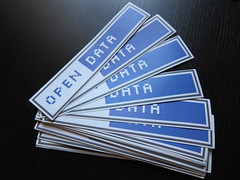
We are currently living in an era where some forms of government and business information or 'data' is being made open and accessible. Known as 'open data', this service can offer a lot of potential for research and development, and improve current services. However, at the same time, individuals are giving away their personal information online in exchange for 'free services' like Facebook and Google, who then sell it to businesses so they can directly market their goods according to our demographics in these same spaces.
The following are some examples of how 'open data' is being used for the common good:
- during the Tsunami in 2004 non-government organisations (NGOs) were unable to share hospital or inventory data as it was not compatible between their software systems, however, this inspired the Royal Thai Government to make open file formats an immediate national priority (Open Technology Foundation Business Plan - downloads a .pdf file)
- when NGOs arrived in Haiti transportation, water, sanitation and health information was able to be quickly gathered and shared through the 'OpenStreetMap' data
- we are using social media spaces like Twitter or Flickr or YouTube or Delicious to communicate, share and broadcast our information without knowing or having an option of easily exporting or sharing the information under our own accord
- we are creating and uploading information directly into a learning or content management systems (LMS) without the use of a repository which allows us to move it to a new space or service or software as required

The way I see it, 'open data' is made of four components:
- raw or 'compatible' data - this is when information is stored in a digital format which is recognisable or 'interoperable' with a range of different software programs eg UNESCO Institute for Statistics Data Centre
- open source software (OSS) - using the collective knowledge of the crowd, OSS shares the software and its code for free use and further development eg Moodle or Mahara
- Creative Commons (CC) - is an intellectual property 'licensing' scheme which allows individuals to publish their works (eg photos, websites, data, music, art, literature etc) which allows others to use it (with certain conditions) eg Australian Bureau of Statistics data (ABS)
- Open Educational Resources (OER) and Open Courseware (OCW) - is where educational resources and courses are made freely available, and in some cases allows others to adapt or contextualise it - eg Wikieducator and MIT OpenCourseWare respectively
One potential model could be the 'Internet of Subjects' Manifesto, which is "a network made up of personal data stores, where identity data and personal information systems representing individuals are at the very centre of the architecture". Under this model, individuals would have more control by separating their data from its meta-data and pointing online services to it, rather than taking control of it.
We are currently in an era where our personal online data is being managed by others for their profit and gain, and privacy is out our control while we are also being given the ability to access, assert and utilise a wide range of information through 'open data' options. However, this is creating a dilemma between wanting more control over who and how our information is used, but encouraging governments and businesses to open and share their information for the common good.
So is it possible to do both - have our data open and closed?

A bit about, Allison Miller, the author of this blog post
Allison Miller is the Business Manager for the E-portfolios business activity for the Australian Flexible Learning Framework. Her previous Framework roles include being the South Australian Innovations Coordinator, and the Project Manager for the Inclusive e-Learning (Youth) Project. Allison has also been the E-Learning Development Co-ordinator for TAFE SA.Allison has been involved in the VET sector for more than eight years in areas of Business Finance, Administration and Small Business Management and has over six years experience in creating e-learning environments for students and staff.
(Source)






No comments:
Post a Comment